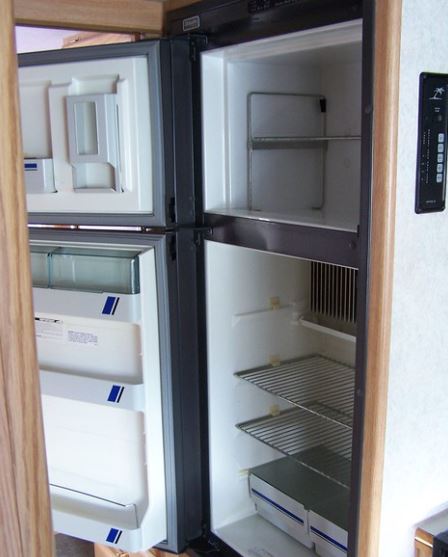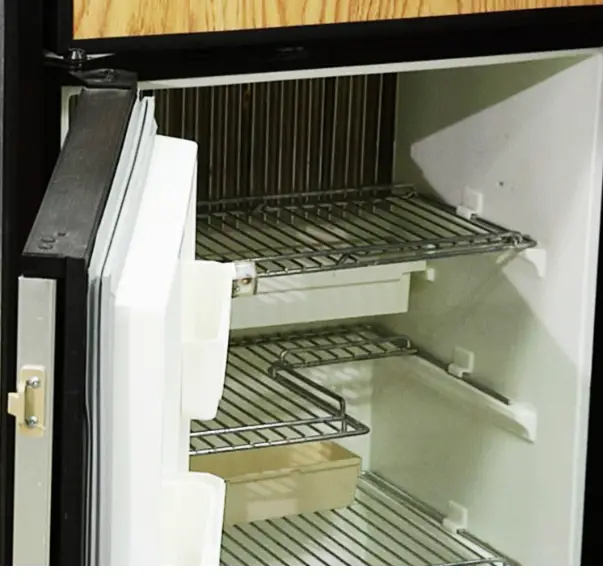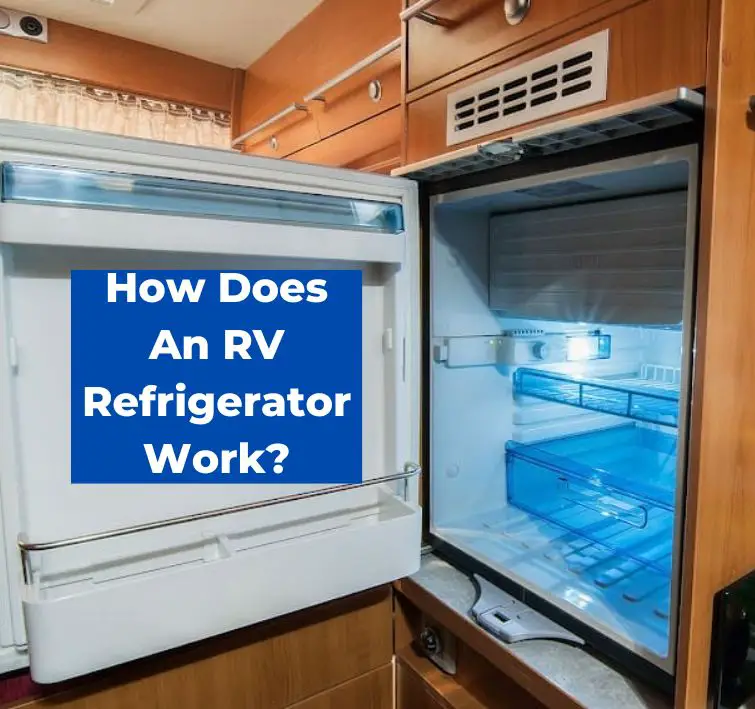RV refrigerators are a crucial part of any RV. They are designed to keep food cold while on the road. However, many people may not know exactly how an RV refrigerator works. So how does an RV refrigerator work?
An RV refrigerator works differently than a traditional refrigerator found in a home. Instead of using a compressor to cool the air, an RV refrigerator uses a combination of heat and chemical reactions to keep the interior cool.
This type of refrigerator is called an absorption refrigerator and is powered by either propane gas, electricity, or both. Understanding how an absorption refrigerator works is important for RV owners to ensure they are using the correct power source and maintaining their refrigerator properly.
Basic Principles Of RV Fridges

An RV refrigerator is a crucial appliance in any RV. It keeps food fresh and drinks cold, making it an essential item for any road trip or camping adventure. Understanding how an RV refrigerator works can help you troubleshoot any issues that may arise and keep your food fresh and safe to eat.
Absorption Refrigeration Cycle
RV refrigerators work on the principle of absorption refrigeration. This is a process that involves the use of a mixture of liquids and gases to remove heat from the air inside the refrigerator. An absorption rv refrigerator cycle consists of four main steps:
- Evaporation: Liquid ammonia evaporates and turns into a gas.
- Compression: The ammonia gas is compressed, which increases its temperature and pressure.
- Condensation: The hot ammonia gas passes through a series of coils and condenses back into a liquid.
- Expansion: The liquid ammonia passes through an expansion valve, which reduces its pressure and temperature, causing it to evaporate again.
This process repeats itself, continuously removing heat from the air inside the refrigerator and keeping the contents cool.
Heat Sources
In an RV refrigerator, heat is required to power the absorption refrigeration cycle. There are three main sources of heat that can be used:
- Propane: Most RV refrigerators are designed to run on propane, which is stored in a tank on the RV. The propane burner provides the heat needed to power the absorption refrigeration cycle.
- Electricity: RV refrigerators can also be powered by electricity when the RV is plugged into a power source. The electricity powers a heating element that provides the heat needed to power the absorption refrigeration cycle.
- Engine Heat: Some RV refrigerators can also be powered by the engine’s alternator when the RV is on the road. The engine heat is used to power the absorption refrigeration cycle.
RV Refrigerator Power Sources
RV refrigerators can run on different power sources, depending on the availability of power. The three main power sources for RV refrigerators are:
- Propane: When propane is used as the heat source, the RV refrigerator can run even when there is no electricity available.
- Electricity: When the RV is plugged into a power source, the RV refrigerator can run on electricity, which is a more convenient and cost-effective option.
- Engine Heat: When the RV is on the road, the engine’s alternator can be used to power the RV refrigerator, which is a great option for long road trips.
Understanding the basic principles of how an RV refrigerator works can help you troubleshoot any issues that may arise and keep your food fresh and safe to eat. By knowing the different power sources and heat sources, you can ensure that your RV refrigerator is always working efficiently and effectively.
Types of RV Refrigerators

RV refrigerators come in different types, each with its own unique features and capabilities. Understanding the differences between these types can help you choose the right one for your RV needs.
3-Way Refrigerators
A 3-way RV refrigerator can run off of AC power, LP gas, and DC power. This means that it can operate using shore power (or a generator), propane, or house batteries.
These refrigerators are absorption refrigerators, which means they use a chemical reaction between hydrogen, ammonia, and water to create a cooling effect. The heating process of ammonia is done using a propane flame or a built-in electric element.
One advantage of 3-way refrigerators is their flexibility in power sources. They can operate on any of the three power sources, depending on what is available or convenient. However, they tend to be more expensive than 2-way refrigerators and may require more maintenance.
2-Way Refrigerators
A 2-way RV refrigerator can run off of AC power and a propane tank. Like 3-way refrigerators, they are absorption refrigerators that use the same chemical reaction to create a cooling effect. However, they do not have the option to run on DC power or house batteries.
2-way refrigerators are generally less expensive than 3-way refrigerators and may require less maintenance. They are also simpler in design, making them easier to repair if something goes wrong. However, they are more limited in power sources and may not be suitable for extended periods of off-grid camping.
Compressor Refrigerators
Compressor refrigerators are a newer type of RV refrigerator that uses a compressor, similar to a household refrigerator, to cool the contents. They are more energy-efficient than absorption refrigerators and can cool down faster. They also do not require any propane or other combustible fuels, making them safer to use.
One downside of compressor refrigerators is that they tend to be more expensive than absorption refrigerators. They also require a steady supply of 12-volt DC power, which may be a challenge for off-grid camping.
How Is An RV Fridge Different Than A Regular Fridge?
RV fridges, also known as absorption refrigerators, are different from regular fridges in several ways. One of the most significant differences is that RV fridges do not have any moving parts inside them, meaning they are less likely to get damaged from being jolted around when driving.
This makes them an ideal choice for use in recreational vehicles, where they need to be able to withstand the vibrations and movements of the road.
Another difference between RV fridges and regular fridges is that RV fridges are typically smaller in size. This is because they are designed to fit into the limited space available in most RVs, and can be as small as a mini fridge.
Despite their smaller size RV fridges are still able to provide adequate cooling for the food and drinks stored inside them.
RV fridges also use a different type of refrigeration technology than regular fridges. While regular fridges use a compressor to circulate refrigerant and remove heat from the interior, RV fridges use something called absorption refrigeration.
Finally, RV fridges are often designed to run on multiple power sources, including propane, battery power, and AC power. This allows them to be used even when the RV is not connected to an electrical hookup, making them a convenient and versatile option for RVers who enjoy boondocking or dry camping.
Absorption RV Fridge Pros And Cons
Absorption RV fridges are a popular choice for many RVers due to their ability to run on propane gas, making them ideal for camping off-grid. Absorption refrigerators come with their own set of pros and cons.
Pros
- Absorption fridges can run on liquid propane gas, which is a great advantage when you don’t have access to power.
- They are relatively quiet compared to other types of RV fridges.
- When operating in propane mode, an absorption fridge uses very little electricity, making it very cost-effective.
Additionally, absorption fridges are available in a variety of sizes, making them suitable for different types of RVs. They also require less maintenance compared to other types of fridges, making them a popular choice for many RVers.
Cons
- Absorption fridges are somewhat dependent on ambient temperature. If it’s too hot, the fridge may warm, and if it’s too cold, it may not function properly either.
- They require to be on a level surface for them to work properly.
- They require ventilation to work efficiently, which means that they may not be suitable for RVs with limited ventilation.
- They are less efficient compared to other types of RV fridges, and older models may use more propane due to their lower thermal efficiency.
Here’s a video that explains the RV absorption cycle very effectively:
Compressor RV Fridge Pros And Cons
Compressor RV fridges are a popular option for many RVers due to their fast and consistent cooling capabilities. They work by using a compressor to compress refrigerant, which then cools down and absorbs heat from the fridge’s interior.
This process allows compressor fridges to cool down quickly and maintain a consistent temperature, which helps prevent food spoilage and keeps drinks cold.
One of the main advantages of compressor RV fridges is their energy efficiency. They use less energy than absorption fridges, which can be important for RVers who want to minimize their energy consumption.
Compressor fridges can also often be powered by solar, making them a good option for off-grid camping.
There are some downsides to compressor RV fridges. One of the main drawbacks is their price. They tend to be more expensive than absorption fridges, which can be a deterrent for some RVers.
Compressor fridges also require a power source at all times, which can be an issue for those who prefer to camp in remote areas without access to electricity.
Whether a compressor RV fridge is the right choice for an RVer will depend on their individual needs and preferences.
Those who prioritize fast and consistent cooling, energy efficiency, and the ability to run on solar may find that a compressor fridge is the best option for them.
This video explains how an RV compression fridge works:
Maintenance and Troubleshooting
RV refrigerators require regular maintenance to ensure they continue to function efficiently. A well-maintained refrigerator can last for many years, but neglecting it can lead to costly repairs or even replacement.
In this section, we’ll cover some basic maintenance tasks and common problems that RV owners may encounter with their refrigerators.
Cleaning and Defrosting
Cleaning the refrigerator regularly is essential to keep it running efficiently. A dirty refrigerator can cause the cooling unit to work harder, leading to increased energy consumption and decreased cooling performance.
To clean the RV refrigerator, start by removing all the food and shelves. Use a mixture of warm water and mild detergent to clean the interior and shelves. Avoid using harsh chemicals or abrasives, which can damage the refrigerator’s finish.
Defrosting an RV refrigerator is also an important maintenance task. Frost buildup can reduce cooling performance and increase energy consumption.
To defrost the refrigerator, turn it off and let it thaw naturally. Alternatively, you can use a hairdryer to speed up the process. Do not use a sharp object to remove the frost, as this can damage the cooling unit.
Cleaning and defrosting your RV fridge should be a regular part of your RV de-winterization schedule.
Common Problems and Solutions
RV refrigerators can experience a range of problems that can affect their performance. Here are some common problems and their solutions:
The refrigerator is not cooling:
Check that the refrigerator is level and that the cooling unit is functioning properly. If the problem persists, it may be due to a faulty thermostat or control board.
The refrigerator is making strange noises:
Check that the refrigerator is level and that there are no obstructions around the cooling unit. If the problem persists, it may be due to a faulty fan or motor.
The refrigerator is leaking:
Check that the drain tube is not clogged and that the refrigerator is level. If the problem persists, it may be due to a faulty door seal or drain pan.
The fridge smells or food tastes funny:
If your RV fridge is producing a weird smell or the food tastes “off”, this could be the sign of an ammonia leak in your RV fridge, which can cause serious health concerns. Make sure to diagnose and remedy this immediately!
If you encounter a problem with your RV refrigerator that you cannot diagnose or fix on your own, it is recommended to seek the assistance of a professional RV technician.
Attempting to repair the refrigerator yourself can be dangerous and may cause further damage.
Frequently Asked Questions
Will RV Fridge Run Off Battery While Driving?
Yes, an RV fridge can run off the battery while driving, but the battery power will not be enough to keep the fridge running for an extended period of time.
It is recommended to use a combination of battery and propane or electric power to keep the fridge running while on the road.
Does A RV Refrigerator Run Off Propane Or Electric?
An RV refrigerator can run off both propane and electric power.
When using propane, the fridge uses a propane burner to heat up the ammonia and hydrogen mixture that creates the cooling effect.
When using electric power, the fridge uses an electric heating element to do the same thing.
How Does An RV Fridge Get Cold?
An RV fridge gets cold through a process called absorption refrigeration.
This process involves heating up a mixture of ammonia, hydrogen, and water, which creates a cooling effect as it evaporates and condenses.
The fridge then circulates this cooled air throughout the unit to keep the contents cold.
Does An RV Fridge Work Better Full Or Empty?
An RV fridge works better when it is full. This is because the contents of the fridge act as insulation, helping to keep the cool air inside.
When the fridge is empty, there is more air space inside, which can lead to more temperature fluctuations and less efficient cooling.
Does A Fridge In An RV Stay On All The Time?
Yes, a fridge in an RV will stay on all the time, unless it is turned off manually.
This is because the fridge needs to maintain a consistent temperature to keep the contents cold and safe to eat.
Can I Run An RV Fridge While Traveling?
Yes, you can run an RV fridge while traveling.
It is recommended to use a combination of battery and propane or electric power to keep the fridge running while on the road.
It is also important to make sure the RV fridge is securely latched shut while driving to prevent contents from spilling.

